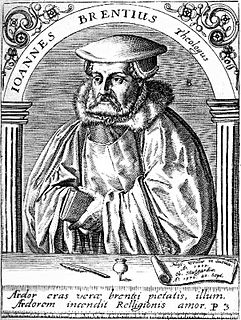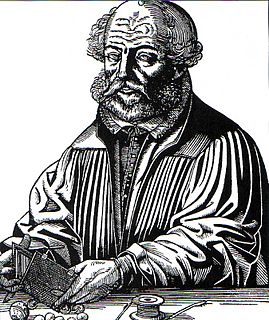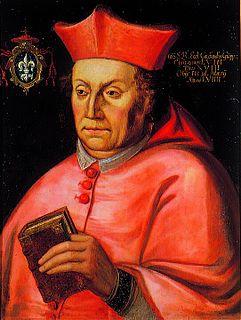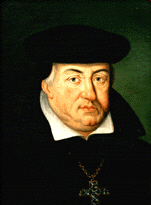Related Research Articles

Theodore Beza was a French Calvinist Protestant theologian, reformer and scholar who played an important role in the Protestant Reformation. He was a disciple of John Calvin and lived most of his life in Geneva. Beza succeeded Calvin as a spiritual leader of the Republic of Geneva, which was originally founded by John Calvin himself.

Martin Bucer was a German Protestant reformer based in Strasbourg who influenced Lutheran, Calvinist, and Anglican doctrines and practices. Bucer was originally a member of the Dominican Order, but after meeting and being influenced by Martin Luther in 1518 he arranged for his monastic vows to be annulled. He then began to work for the Reformation, with the support of Franz von Sickingen.

Johannes Oecolampadius was a German Protestant reformer in the Calvinist tradition from the Electoral Palatinate. He was the leader of the Protestant faction in the Baden Disputation of 1526, and he was one of the founders of Protestant theology, engaging in disputes with Erasmus, Zwingli, Luther and Martin Bucer. Calvin adopted his view on the Eucharist dispute.
Crypto-Calvinism is a pejorative term describing a segment of German members of the Lutheran Church accused of secretly subscribing to Calvinist doctrine of the Eucharist in the decades immediately after the death of Martin Luther in 1546.

The Diocese of Mainz, historically known in English by its French name of Mayence is a Latin rite of the Catholic church in Germany. It was founded in 304, promoted in 780 to Metropolitan Archbishopric of Mainz and demoted back in 1802 to bishopric. The diocese is suffragan diocese in the ecclesiastical province of the Metropolitan Archdiocese of Freiburg. Its district is located in the states of Rhineland-Palatinate and Hesse. The seat of the diocese is in Mainz at the Cathedral dedicated to Saints Martin and Stephen. It is the only Roman Catholic diocese in the world – other than Rome – which bears the title of a Holy See.

The Marburg Colloquy was a meeting at Marburg Castle, Marburg, Hesse, Germany, which attempted to solve a disputation between Martin Luther and Ulrich Zwingli over the Real Presence of Christ in the Eucharist. It took place between 1 October and 4 October 1529. The leading Protestant reformers of the time attended at the behest of Philip I of Hessen. Philip's primary motivation for this conference was political; he wished to unite the Protestant states in political alliance, and to this end, religious harmony was an important consideration.

Peter Canisius was a renowned Dutch Jesuit Catholic priest. He became known for his strong support for the Catholic faith during the Protestant Reformation in Germany, Austria, Bohemia, Moravia, Switzerland and the United Kingdom. The restoration of the Catholic Church in Germany after the Protestant Reformation is largely attributed to the work there of the Society of Jesus, which he led. He is venerated in the Catholic Church as a saint and as a Doctor of the Church.

Johann (Johannes) Brenz was a German theologian and the Protestant Reformer of the Duchy of Württemberg.

Jakob Andreae was a significant German Lutheran theologian and Protestant Reformer involved in the drafting of major documents.

Julius von Pflug was the last Catholic bishop of the Diocese of Naumburg from 1542 until his death. He was one of the most significant reformers involved with the Protestant Reformation.

Johann Gropper was a German cardinal and church politician of the Reformation period.
The Colloquy of Regensburg, historically called the Colloquy of Ratisbon, was a conference held at Regensburg (Ratisbon) in Bavaria in 1541, during the Protestant Reformation, which marks the culmination of attempts to restore religious unity in the Holy Roman Empire by means of theological debate between the Protestants and the Catholics.

Jakob Beurlin was a German Lutheran theologian and Protestant reformer.

Johann Pistorius was a German Protestant minister and Protestant reformer. From 1541 he was the Superintendent at the church in Nidda in Hesse.

Jakob von Eltz-Rübenach (1510–1581) was the Archbishop-Elector of Trier from 1567 to 1581.

Nicholas Goudanus (c.1517–1565) was a Dutch Jesuit and papal diplomat.

Michael Helding was a Roman Catholic bishop, scholar, writer and humanist. He is also known by his pen-name of Sidonius.
The Colloquy of Worms or Conference of Worms (1540–1541) was a meeting held in Worms, Germany with the objective of settling differences between Protestant Reformers and Catholics in Germany. It followed the unsuccessful Colloquy of Hagenau in 1540. Johann Eck represented the Catholics and Philip Melanchthon the Protestants. The Colloquy reached an agreement on the doctrine of original sin, but it decided to end discussions due to the calling of the Conference of Ratisbon.
Colloquy of Worms may refer to either of two meetings of Catholics and Protestants held in Worms, Germany, during the Reformation:

A Lutherstadt is a city where German protestant reformer Martin Luther visited or played an important role. Two cities, Lutherstadt Eisleben and Lutherstadt Wittenberg, have "Lutherstadt" in their official names, while Mansfeld-Lutherstadt is the unofficial name of a district in Mansfeld. These three places which were important in Luther's life were awarded the "European Heritage Label".
References
- Conferences of Worms, article in Schaff-Herzog Encyclopedia of Religious Knowledge, vol. 12, pp. 431–433.